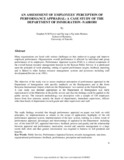| dc.contributor.author | Nzuve, S | |
| dc.contributor.author | Ng'endo, Monica Ng'ang'a | |
| dc.date.accessioned | 2013-06-24T09:27:04Z | |
| dc.date.available | 2013-06-24T09:27:04Z | |
| dc.date.issued | 22-12-12 | |
| dc.identifier.citation | Nzuve, Stephen and Ng'ang 'a Ng'endo, Monica, An Assessment of Employees' Perception of Performance Appraisal: A Case Study of the Department of Immigration - Nairobi (December 22, 2012). Available at SSRN: http://ssrn.com/abstract=2192862 or http://dx.doi.org/10.2139/ssrn.2192862 | en |
| dc.identifier.uri | http://papers.ssrn.com/sol3/papers.cfm?abstract_id=2192862 | |
| dc.identifier.uri | http://hdl.handle.net/11295/38835 | |
| dc.description.abstract | Many organizations are faced with various challenges as they endeavor to gauge and improve employee performance. Organizations overall performance is affected by individual and group performance of its employees. Performance Appraisal system (PAS) is a critical component of the overall human resource management function in the Kenyan Public Service. It is predicated upon the principle of work planning, setting of agreed performance targets, feedback, reporting and is linked to other human resource management systems and processes including staff development (Devries et al, 1981).
The objective of the study was to assess employee perception of performance appraisal in the Department of Immigration with specific emphasis on the Headquarters and at the Jomo Kenyatta International Airport which are the Departments two stations in the Nairobi Region.
A case study was deemed appropriate as the Department of Immigration was fairly representative of the Ministries in the public service and thus the findings could be applied to the public service. The research methodology was descriptive with a sample of 158 employees drawn from four stratums, namely the heads of departments, immediate supervisors, officers other than heads of departments in each grade and other supervisors and staff.
The study findings revealed that though performance appraisal on paper was built on solid principles, its implementation as relates to the scope of application, highlights of the old performance appraisal system, implementation of the new system, training as a direct result of performance appraisal, advantages and shortcomings of appraisal in the Department including use of the form GP 247, appraisal interviews, feedback process and quality and the relationship between appraisal and performance, motivation, reward and sanction management to a large extent falls short and thus greater sensitization was required to harness its full potential and benefits. | en |
| dc.language.iso | en | en |
| dc.publisher | University of Nairobi | en |
| dc.subject | Public Service, Performance Appraisal System, rewards management, sanctions, organizational performance, feedback, performance, perception and motivation | en |
| dc.title | An Assessment of Employees' Perception of Performance Appraisal: A Case Study of the Department of Immigration - Nairobi | en |
| dc.type | Working Paper | en |
| local.publisher | School of Business,University of Nairobi | en |

